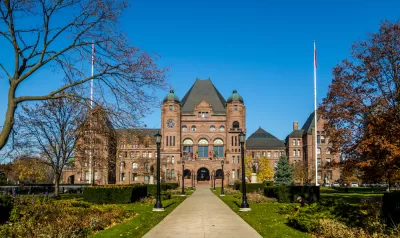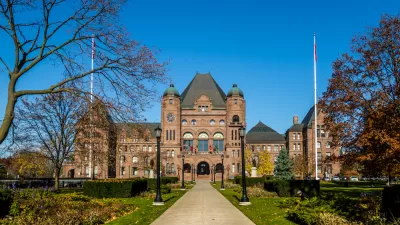The fallout from Ontario Premier Doug Ford's decision to pull the province from the Western Climate Initiative, a cap-and-trade program linked with Quebec and California.

Since his election in June, Ontario Premier Doug Ford has promised to end the province's participation in a cap-and-trade agreement with Quebec and California called the Western Climate Initiative.
The provincial government's financial accountability officer responded to that proposal recently with a study that estimates the cost of ending the deal to reach $3 billion over four years, according to an article by Robert Benzie.
"The province’s budget balance worsens because the loss of cap-and-trade revenue from ending the auction of emission allowances is greater than the savings achieved from cancelling cap-and-trade-related spending programs," according to a statement by Ontario Financial Accountability Officer Peter Weltman.
Ford announced in July that the government would rescind the 4.3 cents a litre addition to gas prices included in Ontario's commitment to the cap-and-trade scheme. California and Quebec closed the market to Ontario in June. More recently, Ford promised 'an orderly wind-down of all programs funded out of cap-and-trade carbon tax revenues,' after describing cap-and-trade programs as a "slush fund" and a "cash grab."
The end of the gas surcharge will also mean the end to the "$1.9 billion in annual programs bankrolled by cap-and-trade revenues," reports Benzie, "including subsidies for retrofitting windows and energy-efficient insulation to help consumers reduce hydro and natural gas bills."
Moreover, the province had been exempted from Canadian Prime Minister Justin Trudeau's federal cap-and-trade program. Now Ontario will be forced into that program, unless it wins an expected lawsuit in court.
FULL STORY: Premier Doug Ford’s cap-and-trade move will cost treasury $3B over four years

Alabama: Trump Terminates Settlements for Black Communities Harmed By Raw Sewage
Trump deemed the landmark civil rights agreement “illegal DEI and environmental justice policy.”

Study: Maui’s Plan to Convert Vacation Rentals to Long-Term Housing Could Cause Nearly $1 Billion Economic Loss
The plan would reduce visitor accommodation by 25% resulting in 1,900 jobs lost.

Why Should We Subsidize Public Transportation?
Many public transit agencies face financial stress due to rising costs, declining fare revenue, and declining subsidies. Transit advocates must provide a strong business case for increasing public transit funding.

Wind Energy on the Rise Despite Federal Policy Reversal
The Trump administration is revoking federal support for renewable energy, but demand for new projects continues unabated.

Passengers Flock to Caltrain After Electrification
The new electric trains are running faster and more reliably, leading to strong ridership growth on the Bay Area rail system.

Texas Churches Rally Behind ‘Yes in God’s Back Yard’ Legislation
Religious leaders want the state to reduce zoning regulations to streamline leasing church-owned land to housing developers.
Urban Design for Planners 1: Software Tools
This six-course series explores essential urban design concepts using open source software and equips planners with the tools they need to participate fully in the urban design process.
Planning for Universal Design
Learn the tools for implementing Universal Design in planning regulations.
Caltrans
Smith Gee Studio
Institute for Housing and Urban Development Studies (IHS)
City of Grandview
Harvard GSD Executive Education
Toledo-Lucas County Plan Commissions
Salt Lake City
NYU Wagner Graduate School of Public Service




























